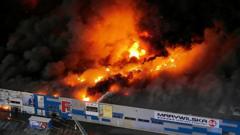Poland has leveled serious accusations against Russian intelligence services, claiming they orchestrated a devastating fire that nearly obliterated the Marywilska shopping centre in Warsaw last year. According to Prime Minister Donald Tusk's announcement via X, Polish authorities are confident that the blaze was set deliberately at the behest of Russian special services. Tusk stated that some individuals connected to the incident are already under arrest, with a comprehensive manhunt underway for others implicated in the operation.
While the Kremlin has not responded directly to these allegations, it has previously dismissed claims of orchestrating sabotage across Europe. The fire, which occurred in May 2024, wreaked havoc on around 1,400 small businesses, many of which were run by members of Warsaw's Vietnamese community. Following a year-long investigation, Polish authorities concluded that the fire was orchestrated by an unnamed individual in Russia. A joint statement from Poland's justice and interior ministers emphasized that the arson was "organized and directed by a specific person residing in the Russian Federation," with cooperation from Lithuania regarding ongoing investigations.
The situation has escalated since Russia's aggressive actions in Ukraine, with Poland having detained multiple individuals accused of conducting sabotage on behalf of Russian state operatives. Polish officials have claimed these incidents reflect a "hybrid war" waged by Moscow, a term that denotes anonymous and deniable assaults on a nation's infrastructure designed to weaken its stability without crossing the threshold of outright war.
NATO shares concerns about Russia's hybrid warfare strategies across Europe, perceiving them as attempts to undermine Western support for Ukraine. The accusations align with previous claims, including those from Lithuanian prosecutors who alleged that Russia's military intelligence service was responsible for an arson incident involving an Ikea branch in Vilnius.
In related developments, Tusk remarked in March that Lithuania had confirmed suspicions linking Russian secret services to the fires at shopping centres in both Vilnius and Warsaw, resulting in the arrests of two Ukrainian suspects. The Marywilska shopping centre, which opened in 2010, was not only a hub for commerce but also held significant amounts of cash and essential documents for many of its workers, who stored their valuables there due to concerns about burglary at home. Since the fire, the owners have established a temporary shopping centre and a new location named Modlinska 6D, which has allowed around 400 traders to resume their operations.

















